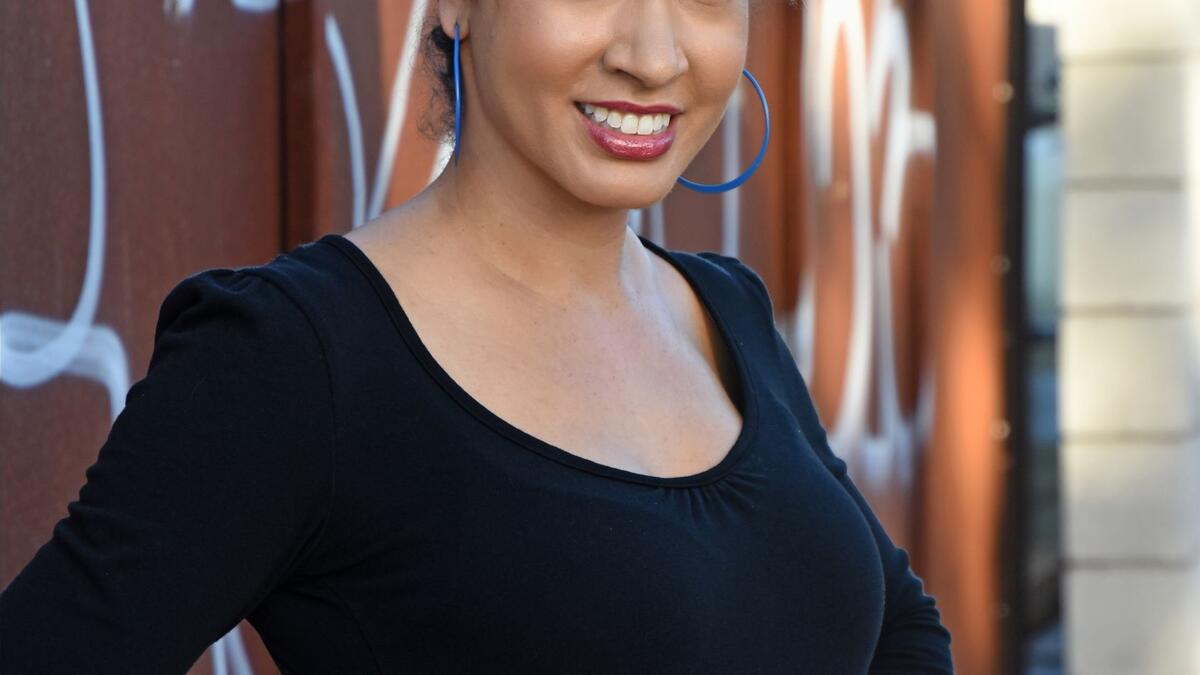Interim director heads studio that integrates arts, culture, design to create inclusive communities

Chandra Crudup, interim director of the Studio for Creativity, Place and Equitable Communities. Photo by Laura Durant
An experienced advocate for equitable communities is now the interim director of an Arizona State University-based studio that integrates arts, culture and design to advance just and inclusive places to live where all people can thrive.
Chandra Crudup succeeds Herberger Institute for Design and the Arts Institute Professor Maria Rosario Jackson at the helm of the Studio for Creativity, Place and Equitable Communities following Jackson’s confirmation this year the new chair of the National Endowment for the Arts. Jackson founded the studio, a joint effort of the Watts College of Public Service and Community Solutions and the Herberger Institute, in 2016.
Crudup also serves as the associate dean for Inclusive Design for Equity and Access (IDEA) at the Watts College and as a clinical associate professor in the School of Social Work.
Watts College Dean Cynthia Lietz said Crudup’s leadership enhances the strong collaboration between the college and the Herberger Institute for Design and the Arts.
“I am so pleased that Dr. Chandra Crudup will continue the incredible tradition of collaboration and commitment to equitable communities that Professor Jackson was able to realize during her tenure as director,” Lietz said. “We are fortunate to have Professor Crudup take on this important role.”
Herberger Institute Dean Steven Tepper agreed.
“Dr. Crudup will lead a studio that is the first of its kind in the nation to integrate the disciplines, approaches and ideas of these two nationally prominent colleges,” he said. “In her own multidisciplinary education, scholarship and leadership, she embodies the ideals that drive and animate the studio: advancing the health of our democracy and our communities by integrating creativity, design, art and culture into public policy, administration and community solutions.”
Crudup said she’s excited to be following in Jackson’s footsteps: "She has so many decades of experience doing this work. There is so much that she’s done that I’m not even aware of. What’s most inspiring is her ability to distill core understandings of root causes to structural issues through her own lived experiences.”
In addition, Crudup has held several positions at ASU that focus on equity. She is a founding member of the Watts College Committee on Diversity and Inclusion, which was created following the success of the ASU School of Social Work’s Ad Hoc Diversity Committee. She also served as a member and downtown representative of the Faculty Women of Color Caucus and has been a past contributor to ASU’s Center for the Study of Race and Democracy.
Crudup said her new role fulfills many criteria for a “dream job,” as it allows her to combine her time spent in theater, community-building, engagement and collaboration to break down structures in society that she said have “voided community-building and inclusion.”
“We need to focus on historically underrepresented populations through informed community collaborations,” she said. “As interim director, I have all kinds of new ideas on how to listen, nurture and grow the program by exploring more ways that arts, culture and design can combine for continued creation and maintenance of inclusive communities.
“Usually people think about arts as physical things like murals, landscape structures, architecture, fine arts or the performing arts. But arts and culture can also be the creative process. We’ve become a very output-oriented community, and we forget about including voices throughout the process. We should ensure there are diverse voices from different perspectives.”
The studio’s staff includes Christina Park, who serves as assistant director, and Ascala Sisk, senior policy fellow.
Through several initiatives, such as the Faculty Academy, Creative Measurement Lab and Projecting All Voices, the studio engages in building the field of equitable, creative placemaking and placekeeping.
The Faculty Academy is a learning cohort that connects scholars across the Herberger Institute and the Watts College, and is intended to help participants build the skills, personal reflections and insights needed to do ethical work.
One of the newest initiatives to join the studio, Projecting All Voices, provides opportunities for artists and culture workers to advance ideas and projects that investigate race, identity, cultural heritage, power, policy, ability and/or place and community.
The fellowship program seeks to inform how educational and cultural institutions must adapt to prepare, support and advance the creative choices of a changing America through an equitable lens and framework of practice. The next round of fellows will be announced later this summer. This work is led by senior project manager Gabriela Muñoz.
In coming months, the studio will announce several other exciting national projects it is working on that embody the dynamic values of centering voices, process and collaboration.
Sign up here to receive the studio’s "Creative Placemaking" newsletter.
More Arts, humanities and education

ASU professor, alum named Yamaha '40 Under 40' outstanding music educators
A music career conference that connects college students with such industry leaders as Timbaland. A K–12 program that…

ASU's Poitier Film School to host master classes, screening series with visionary filmmakers
Rodrigo Reyes, the acclaimed Mexican American filmmaker and Guggenheim Fellow whose 2022 documentary “Sansón and Me” won the Best…

Upcoming exhibition brings experimental art and more to the West Valley campus
Ask Tra Bouscaren how he got into art and his answer is simple.“Art saved my life when I was 19,” he says. “I was in a…

